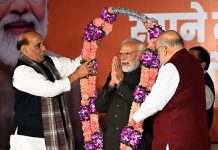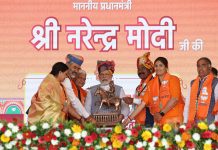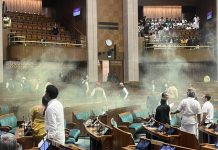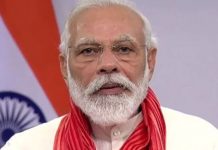 Vladimir Lenin once said, “The idea that we can never make compromises and changes of tack during this war (Bolshevik revolution) is childish.” He had pointed that there were “cases of exceptional difficulty and complexity, when the greatest efforts were necessary for a proper assessment of the actual character of this or that ‘compromise.’ “Lenin also points out that the history of the Russian Revolution is full of examples of compromises carried out by the Bolsheviks, which he calls “changes of tack”. The Bolsheviks made deals not only with other revolutionary forces but also with bourgeois parties.
Vladimir Lenin once said, “The idea that we can never make compromises and changes of tack during this war (Bolshevik revolution) is childish.” He had pointed that there were “cases of exceptional difficulty and complexity, when the greatest efforts were necessary for a proper assessment of the actual character of this or that ‘compromise.’ “Lenin also points out that the history of the Russian Revolution is full of examples of compromises carried out by the Bolsheviks, which he calls “changes of tack”. The Bolsheviks made deals not only with other revolutionary forces but also with bourgeois parties.
The Prakash Karat and S Ramachandran Pillai-led ‘no alliance, no understanding with the Congress’ line has been approved by CPI(M) Central Committee, rejecting a slightly different formulation advocated by party general secretary Sitaram Yechury by a 55-31 vote. The word ‘understanding’ in the Karat draft meant to close all possibilities of an informal or tacit association with the Congress in the future. The dogmatism of some comrades is pushing the future of the party into obscurity. They may claim to be ideologically astute as compared to Yechury but their decisions say otherwise. The ideological rigidness of the party created history by denying a third term to Yechury and failing to send anyone to the Rajya Sabha for the first time in nearly 60 years.
In July 2008, Prakash Karat, ignoring the opposition of Bengal unit and defying the advice of party patriarch Jyoti Basu, withdrew support from the UPA government. This reckless decision not only failed to topple the UPA at the Centre, but also gave a heavy blow to the Left parties, particularly the CPM. In the 2009 General Election, the Congress returned to power with greater strength while the Left Front’s tally came down from 60 to 24 seats. One misstep taken by a dogmatic general secretary 10 years ago has led to the near-irrelevance of the CPM in Bengal and has reduced the party to just 9 seats in Lok Sabha. It is difficult to say whether the party will manage to secure a single seat from West Bengal in the next general elections.
Yechury and Karat represent the interests of the party’s West Bengal and Tripura, and Kerala units respectively, the states where the CPM still has a presence. The Kerala party unit’s opposition to Yechury is explained by the fact that the UDF headed by the Congress is the only viable alternative to the CPI(M) in Kerala; Karat’s anti-Congress approach makes perfect sense to Kerala legislators. The alignment with Congress, even if it is for a national purpose, might be challenging for the CPI(M) unit in Kerala, because it is difficult to explain joining hands with the local principal opponent. However, the Kerala unit seems to either ignore or forget that CPI(M) is no longer a national player on the political stage. In today’s time, whether its tactical line is to be or not to be with the Congress is unlikely to be of much interest, even to the Congress. While Congress continues to have a national footprint, though fast diminishing, the CPI(M) has been reduced to a regional player. Leaving aside Kerala, Tripura and West Bengal, it will find it difficult to influence electoral politics in any other part of India. Of the three states in which it still matters, the CPI(M) is in power in Kerala and Tripura and the main Opposition party in West Bengal in terms of vote share. Former Kerala CM and Veteran CPI(M) leader V.S. Achuthanandan, who is also popularly referred as the Fidel Castro of India, said he is in favour of forming a “broader unity of Left and democratic forces including Congress”.
This claim was also supported by Thomas Isaac, the current finance minister of Kerala. All Central Committee members from West Bengal, Maharashtra, Delhi, Uttar Pradesh, Punjab, Gujarat, Madhya Pradesh, Uttarakhand, Chhattisgarh, Karnataka, and Jammu and Kashmir supported the Yechury faction. Also, a few members from Tripura and three of the five members from Tamil Nadu sided with the Yechury faction. Yet, members from Kerala, Andhra Pradesh, Telangana, Bihar and Haryana, sided with Karat and outweighed the interests of 13 states.
Some leaders like Amra Ram in Rajasthan, Mohd Yousuf Tarigami in Kashmir, and unions like CITU and All India Kisan Sabha have retained some grounds. But even members of these organisations don’t find much purpose voting for CPI(M) when compared to any other national party. The world’s largest strike took place in 2016, when 180 million workers put down their tools under the initiative of Left parties, but these workers will not vote for CPI(M) because they know that it doesn’t have the capability to tackle BJP on its own. The citizens in non-CPI(M) ruled states will not waste their vote in voting for a party which they know cant represent their interests in Parliament.
PI(M)’s commitment to fighting communal forces is nothing more than empty rhetoric. You cannot fight communal forces by weakening secular parties. Considering the current political scenario, irrespective of whether the Congress is genuinely against BJP’s policies or whether it only differentiates itself for electoral gain, Congress is the only party which has the backbone to defeat BJP. If the secular democratic parties do not support Congress they will just end up dividing the votes and giving the benefit to communal forces.
 Senior leaders in CPI(M) agree that the BJP-RSS is the “biggest threat the country is facing presently”,but this assessment is of no use if under the pretext of opposing neo-liberal economic policies the hardliner comrades are paving way for the victory of BJP. Everyone has had this issue with Indian communists that they only indulge in intellectual talk. Their idea of bringing about social change might be good but a poor, uneducated man who always voted his caste instead of casting his vote would be least interested in understanding Marxist economics. In fact, people in some states don’t even know what CPI(M) is all about.
Senior leaders in CPI(M) agree that the BJP-RSS is the “biggest threat the country is facing presently”,but this assessment is of no use if under the pretext of opposing neo-liberal economic policies the hardliner comrades are paving way for the victory of BJP. Everyone has had this issue with Indian communists that they only indulge in intellectual talk. Their idea of bringing about social change might be good but a poor, uneducated man who always voted his caste instead of casting his vote would be least interested in understanding Marxist economics. In fact, people in some states don’t even know what CPI(M) is all about.
After ascent in the BJP’s fortunes in the early 1990s, CPI(M) stalwarts Jyoti Basu and Harkishen Singh Surjeet rightly perceived the Congress as “the lesser evil” and left their old hostility towards the party. They understood the urgent need of all secular parties to unite against the communal forces. It was this new approach that resulted in the Left parties’ extension of outside support to the Congress government led by PV Narasimha Rao in 1991. Deeply shocked by the 2002 Gujarat riots, the Left parties realised that if these communal forces were not stopped, they would pose a serious threat to the social fabric of India. It was this concern that made Surjeet play a key role in the formation of the first UPA government in 2004 in order to stop the BJP-led NDA from returning to power. After Surjeet had no choice but to resign due to his old age and failing health, in April 2005, Karat became the party’s general secretary. He undid in just three years what his predecessor had painstakingly achieved over several years, which was nothing but consolidation of secular forces.
According to a Wikileaks report, just 10 days before Karat became the general secretary of the party on April 11, 2005, then US ambassador to India David Mulford had sent an extensive cable to Washington evaluating Karat and his party which said: “CPM icon Jyoti Basu (is) concerned that Karat will not be as adept at handling the Congress or even the Left Front coalition as well as Surjeet.”
Somnath Chatterjee, former Speaker of Lok Sabha and parliamentarian who had represented CPI(M) in Parliament for nearly four decades, claimed that Yechury had been trying hard to put the pieces together, but there was a limit to his tolerance. He further stated that Karat’s victory was Modi’s victory. Under the previous general secretary, the party was on the course of its extinction. All his decisions and policies cost the party a lot. And it started when he refused to allow Jyoti Basu to become the Prime Minister, followed by his decision of withdrawing support to the UPA.
The Congress, the Samajwadi Party (SP) and the Rashtriya Janata Dal (RJD) are only three other political parties in the country which haven’t had any kind of alliance with the right wing political outfit. For CPI (M), what remains is the SP and the RJD. The SP is in its weakest position ever in its history and RJD’s chief Lalu Prasad, meanwhile, has been imprisoned in the fodder scam. BJP is ten times mightier than it was in 2004 and it is not possible for the CPI (M) to fight the BJP alone in the whole country without the support of a party like the Congress which has roots in all states. Interestingly, in a major blow to Karat and his faction, CPI(M) leaders in West Bengal have vowed to split the party this year if the party would not approve an alliance with the Congress before 2019. If the broader coalition with secular parties is not approved, they will have no other way.
On one hand, the CPI(M) central committee’s draft resolution said that the main aim of the party is to “defeat the BJP” and it will spare no effort in “mobilising all secular democratic forces” in pursuit of this goal. And on the other, Yechury’s sensible and practical proposal for a tactical understanding with the Congress was comprehensively rejected. If the Karat faction would not let the general secretary work, then they shouldn’t have taken an initiative to bring Yechury as general secretary. It is rumoured that Brinda Karat or S Ramachandran Pillai might succeed Yechury as the next general secretary. A final decision on the party’s strategy would be taken at the April meeting. For CPI(M), which projects itself as one committed to ideology, Karat’s line could be seen as the politics of principle. But in today’s political context, when the BJP is the country’s dominant political force, it might not be a practical position to take. The Yechury faction is hoping for a turnaround in Hyderabad. If the party does not forge some fortuitous alliance, it risks further alienation in Indian politics.
The writer studies at Christ University, Bangalore and has a keen interest in politics. The views expressed are his own.
letters@tehelka.com











